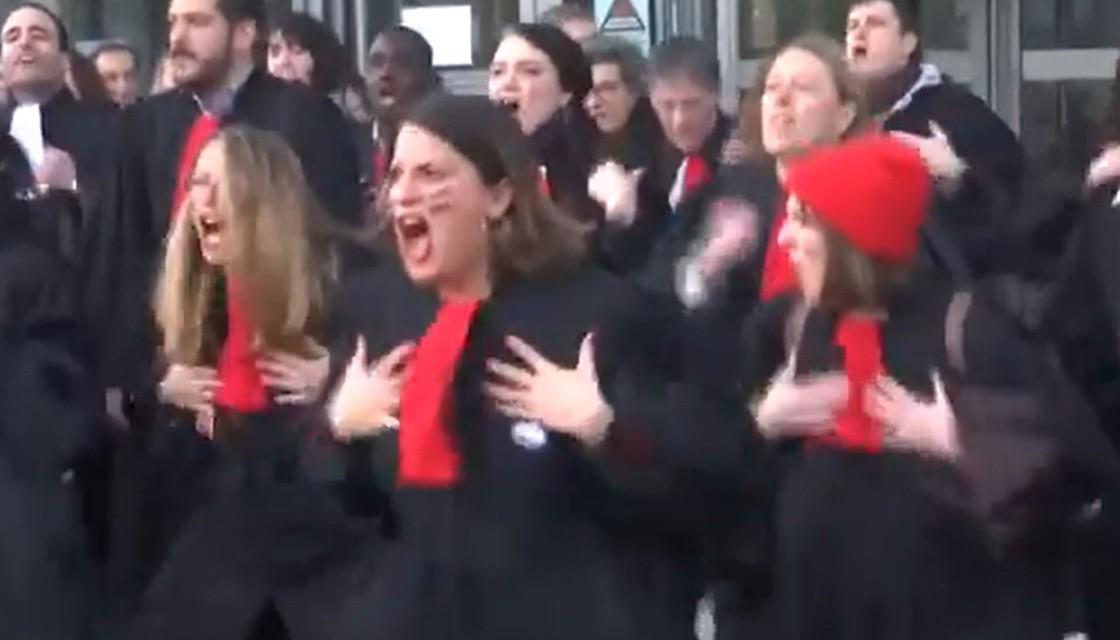A group of French lawyers protesting pension reforms with a haka has caused outrage online.
Video of the protest was shared on Twitter on Thursday, showing the group - clad in black legal robes and red ties - attempting to perform the traditional Māori dance.
STEAM Māori cultural adviser Karaitiana Taiuru told Newshub it was "absolutely appalling" and "disturbing" behaviour.
"There is no excuse in this modern age to claim ignorance with appropriating and mocking other people's culture.
"I would expect that the group make an open letter apology to Māori and New Zealanders who identify with the Haka.
"This is a racist stereotype that has been perpetuated over generations of settlers from Europe in order to justify their own criminal actions."
The lawyers have been fighting since January 6 to defend their current pension plan against proposed reforms. So far, they have mixed traditional protest techniques - such as staging marches and waving banners - with more novel ways, such as producing viral videos and organising flash mobs, reports France 24.
But their latest act may have gone too far, with the group accused of cultural appropriation.
https://twitter.com/BexGraham/status/1220277050625277954
"Yikes! Way to look like colonial racists stuck in the 1950s," wrote one person on Twitter in response to the video.
"It is so wrong," wrote someone else. "It is offensive to Māori and their cultural heritage."
https://twitter.com/tieaknotinit/status/1220162401300955136
Another summed up the situation in more blunt terms, writing: "Oi! Leave our stuff alone, bro!"
The video also sparked an opinion piece in The Guardian, with Morgan Godfery calling it a "protest gimmick, a way to jimmy up attention".
In discussing when the performance of a haka is cultural appropriation, Godfrey suggests asking "does the performance maintain the haka's integrity?"
- Race Relations Commissioner Meng Foon defends Christchurch festival's use of blackface character
- Blackface is racist and not open to interpretation
- Race Relations Commissioner slammed for defending use of blackface
- A REFUGEE IN MY OWN COUNTRY
"I appreciate that – at least in the sense haka can take form in a protest. But it isn’t, as some Europeans and North Americans seem to understand it, an act of unrestrained id. It isn’t necessarily just an outlet for anger," writes Godfery.
"Until Europeans and North Americans can drop that (probably racist) idea that haka is all about releasing anger, one general rule applies: don’t perform a haka you were never given permission to. That’s the best way to preserve its mana and mauri."
The performance was certainly not the first time people have been accused of the cultural appropriation of Māori culture.
Last year Air New Zealand sparked a backlash when it tried to trademark the use of "kia ora" for its inflight magazine.
The airline applied to the New Zealand Intellectual Property Office to trademark the logo of its magazine, which uses the greeting.
- Anti-Defamation League lists 'OK hand sign' as white supremacist hate symbol
- Anonymous 'racist', 'sexist' letter sent to Hutt City council candidate, Shazly Rasheed
- How many times does this need to be said? Pākehā is not a slur.
- Australian-based Māori man speaks out after being refused restaurant entry because of his tā moko
In its application, the company said it was "simply about protecting the logo".
"This is the logo for the magazine title. It's standard corporate practice to have all our logos trademarked and we have just started the process given Kia Ora has recently been through a refresh," a spokesperson said.
The move was not viewed favourably, with Māori Council executive director Matthew Tukaki saying it was an "insult to all Māori and all New Zealanders".
Air New Zealand eventually dropped its bid to trademark the logo in face of the objections.





